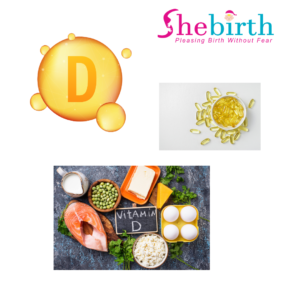Vitamin D during Pregnancy: Essential for Bone Health and Immune Function

Vitamin D during pregnancy plays a vital role in maintaining bone health and supporting the immune system. Adequate vitamin D levels during pregnancy are essential for proper bone development and the overall health of the baby.
Role of Vitamin D in Pregnancy
Vitamin D helps the body absorb calcium, which is essential for the development of bones and teeth in the baby. It also supports the immune system and helps regulate cell growth. Adequate vitamin D levels can reduce the risk of complications such as rickets and preeclampsia.
Recommended Dosage
The recommended daily intake of vitamin D for pregnant women is 600 International Units (IU). This amount can be obtained through sunlight, diet, and supplements.
Vitamin D Sources
Vitamin D can come from different sources:
- Sunlight: Sunlight helps the body produce vitamin D naturally.
- Fatty fish: Salmon, mackerel, and sardines are rich in vitamin
- Fortified foods: Some dairy and grain products are fortified with vitamin D.
- Eggs and liver: These foods also contain vitamin D.
Vitamin D Supplementation
Many prenatal vitamins are fortified with vitamin D to ensure adequate absorption during pregnancy. If you have limited sunlight exposure or have trouble getting enough vitamin D from your diet, your doctor may recommend an additional supplement.
Possible side effects
Vitamin D is generally safe when taken in recommended amounts. Excessive consumption can be toxic and cause symptoms such as nausea and kidney stones. Be sure to follow the recommended dosage and consult your doctor if you have any questions.
When to start taking vitamin D during pregnancy?
It is recommended that you start taking vitamin D as soon as you find out you are pregnant or even when you are trying to conceive. This ensures that your body has enough to meet the increased needs during pregnancy. Many prenatal vitamins contain vitamin D, but if your vitamin D levels are low, your doctor may recommend an additional supplement.
Why is vitamin D important during pregnancy?
Vitamin D is essential for the development of your baby’s bones, teeth, and immune system. It helps regulate levels of calcium and phosphate in the body, which are essential for maintaining bone health. Low vitamin D levels during pregnancy have been linked to complications such as preeclampsia, gestational diabetes, premature birth, and low birth weight.
What happens if you are vitamin D deficient during pregnancy?
Low vitamin D levels during pregnancy can cause several problems for both mother and baby, including:
Increased risk of preeclampsia: a disease characterized by high blood pressure and possible damage to other organs, such as the liver and kidneys.
- Bone health problems: Both mother and baby may have weaker bones, increasing the risk of fractures and osteoporosis later in life.
- Immune system complications: Vitamin D supports immune function, and a deficiency can make mother and baby more susceptible to infection.
How much vitamin D is safe to take during pregnancy?
The recommended daily intake of vitamin D during pregnancy is generally around 600 IU (15 micrograms). However, some experts say higher doses (up to 4,000 IU) may be safe and beneficial, especially for women with low vitamin D levels. To be safe, always talk to your doctor before taking a higher dose.
How to Boost Vitamin D Levels During Pregnancy?
You can increase your vitamin D levels by:
- Sun exposure: Spending 10 to 30 minutes in the sun a few times a week can help your body produce vitamin D. The amount of sunlight needed varies by skin color, location, and season.
- Diet: Include foods rich in vitamin D in your diet, such as: B. fatty fish (e.g. salmon), fortified milk, and egg yolks.
- Supplements: If you are not getting enough vitamin D through sunlight and diet, supplements can help. Your doctor can recommend an appropriate dose for you.
Is it safe to take 5,000 IU of vitamin D during pregnancy?
While the standard recommended dose is 600 IU, some women may need higher doses to achieve adequate levels, especially if they are deficient. Under medical supervision, taking 5,000 IU per day is likely safe, but it is also important to follow your doctor’s instructions to avoid possible toxicity.
Vitamin D is an important nutrient during pregnancy and is essential for the health of you and your baby. Taking supplements early and ensuring adequate levels through diet, sunlight exposure, or supplements can prevent complications and support a healthy pregnancy. Always consult your doctor for personalized advice about vitamin D supplementation during pregnancy.
